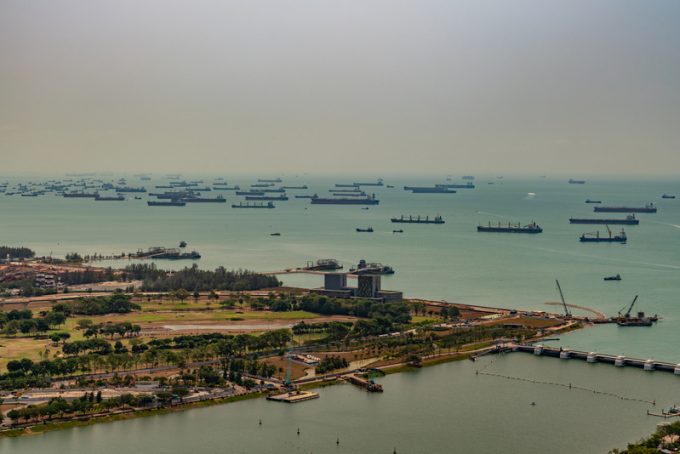Carriers look to short-term gains over blanking, as Red Sea crisis props up rates
With the Red Sea crisis continuing to artificially prop up container spot rates, carriers have ...

Ships leaving yards after scrubber retrofits are being held at anchor to await open slots on service networks and may face further idling due to soft demand forecasts, said Alphaliner.
However, given the substantial fuel cost saving achievable by these vessels, still able to bunker with HFO (heavy fuel oil), against the more-expensive LSFO (low-sulphur fuel oil) that ships without scrubber technology must consume, carriers’ ship planners want to redeploy them at the earliest opportunity.
Following the introduction of the IMO 2020 sulphur cap regulations, brokers have already established a two-tier market for scrubber-fitted containerships. The consultant said the substantial daily hire rate differential was “setting scrubber-fitted vessels apart”.
Indeed, one London container broker told The Loadstar charterers were offering “silly” rates for ships with scrubbers.
He said: “I think the premium for LSFO has caught many operators out, especially in Asia, and we are being offered double the daily hire rate for any scrubber ships we can get our hands on.”
According to the latest survey by Alphaliner, the number of ships undergoing scrubber installation had fallen to 84 on 20 January – down from 104 units on 6 January.
As long as the premium for LSFO remains significant – it is currently around $200 per ton in Rotterdam and $250 per ton in Singapore – it follows that scrubber-fitted ships will be in great demand regardless of any weaknesses that might develop in the overall charter market.
In this respect, the outbreak of the coronavirus in China and subsequent delay in a return to manufacturing after the Chinese new year, is likely to be a drag on the market as carriers void further headhaul sailings from Asia.
In the absence scrubber-fitted ships, charterers are looking for the most fuel-efficient designs on offer, with the probability that ageing fuel-guzzling vessels will become early candidates for recycling.
And carriers that decided at an early stage on a pro-scrubber strategy, such as MSC and Evergreen, are set to enjoy a significant cost advantage over predominately anti-scrubber peers such as Maersk, Hapag-Lloyd and ONE.
A carrier source told The Loadstar recently that, on its Asia-North Europe route, it was now budgeting to recoup the direct cost of scrubber retrofits in just over six months.
“Of course, it has cost us quite a lot of money to position the ships at the shipyards and charter temporary replacements, but the fuel cost savings are already substantial, and that will give us a significant advantage for as long as the premium for low-sulphur bunkers continues,” he said.
And shippers that have mostly agreed to pay carriers’ low-sulphur fuel charges do not appear to have differentiated between container lines on the quantum of the amount payable, with several major forwarders calculating their own contribution regardless of whether the carrier deploys scrubber-fitted ships or not within its fleet.
Comment on this article
Martyn Benson
April 01, 2020 at 9:38 amNot to sound like a ‘Johnny-come-lately’ but just re-read this article on April 1st and the entire piece now sounds like a bad April Fool’s joke (with the quoted carrier source sounding like the Fool).
Scrubbers were always going to be a gamble because of the substantial initial investment and the increased speculation about their effectiveness and cleanliness in operation has now been reinforced by a confluence of circumstances only a coupe of months into their use.
The intention of IMO2020 was to help clean up the planet and not to find ways to carry on as before, so let’s hope that operators now start to use VLSFO as a routine, which will naturally bring and hold down its price, even after the OPEC bickering has subsided.
Stay safe.
Mike Wackett
April 01, 2020 at 3:25 pmHindsight is a wonderful thing Martyn. When the article was written even the reluctant scrubber lines such as Maersk and Hapag were scrambling to book scrubber retrofits given the then and predicted future spread between HFO and LSFO. But unless you had a crystal ball who could have predicted Covid-19 hitchhiking its way around the globe and a third of the world being placed in lockdown? And remember IMO offered the shipping industry the choice in order to comply with its 0.5% sulphur cap. When we get through this, as we will, watch how long the $20 for a barrel price lasts.